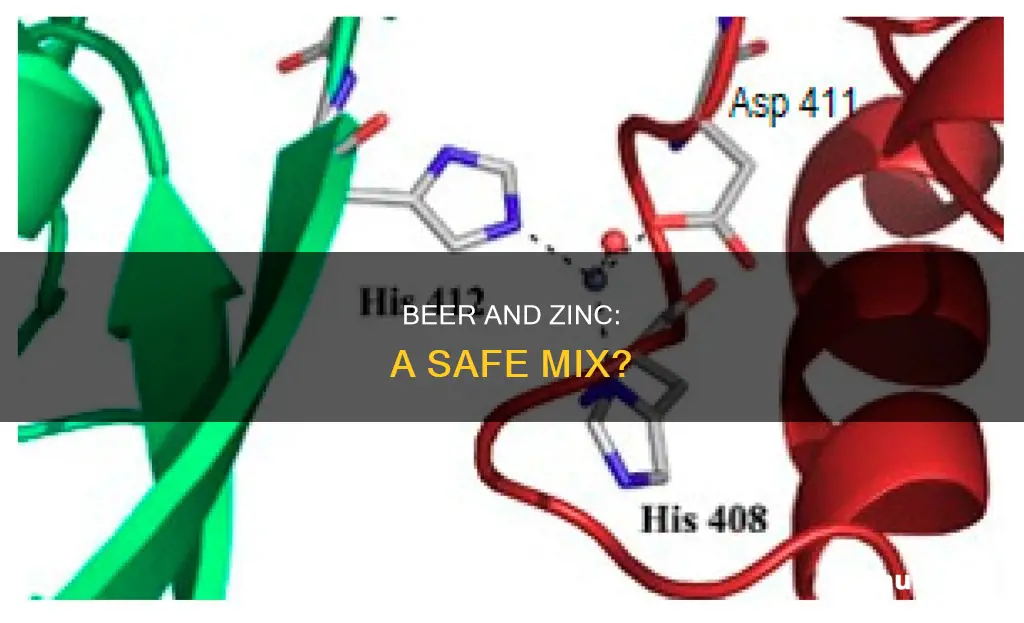
Zinc is the second most prevalent trace element in the body and is found in every cell. It is an essential mineral that humans get through their diet. Alcoholics are often zinc deficient, and while zinc has not been extensively studied as a treatment for alcoholism, it is a requisite cofactor in the metabolism of alcohol. Alcohol dehydrogenase (ADH), the body's main enzyme for alcohol metabolism, contains zinc at its catalytic site.
Zinc is also important for immune function, reproduction, growth, taste, vision, and smell, blood clotting, and proper insulin and thyroid function. It also has antioxidant properties, helping to protect cells from damage caused by free radicals.
While it is rare for people in industrialized countries to be seriously deficient in zinc, those who drink heavily may be at risk of deficiency.
| Characteristics | Values |
|---|---|
| Can zinc be taken while drinking beer? | Yes |
| Is it beneficial to take zinc while drinking beer? | It can be beneficial to take zinc while drinking beer as it is a requisite cofactor in the metabolism of alcohol. |
| What is the recommended daily allowance of zinc for adults? | 8-11 mg |
| What are the symptoms of zinc deficiency? | Loss of appetite, poor growth, weight loss, lack of taste or smell, poor wound healing, skin problems, hair loss, lack of menstrual period, night blindness, white spots on the fingernails, and depression |
| What are the common side effects of zinc? | Stomach upset, nausea, vomiting, and a metallic taste in the mouth |
| What are the high-dose side effects of zinc? | Dizziness, headache, drowsiness, increased sweating, loss of muscle coordination, alcohol intolerance, hallucinations, and anemia |
What You'll Learn

Zinc is a requisite cofactor in alcohol metabolism
Zinc is critical for the proper functioning of ADH, which transforms ethanol to acetaldehyde in the liver. This process is the first and main system of alcohol metabolism, with two other systems playing supporting roles. The second system involves CYPs, which oxidize ethanol in the microsomes of cells, known as the microsomal ethanol-oxidizing system (MEOS). The third system involves catalase in the peroxisomes, which acts upon hydrogen peroxide as a substrate, metabolizing no more than 5% of all liver ethanol.
Zinc is also important for protein intake, as poor protein intake correlates with poor zinc status. Symptoms of zinc deficiency include poor growth, infertility, skin disease, impaired immune function, altered taste and smell, impaired night vision, and altered protein metabolism.
Zinc deficiency is common among alcoholics, and adequate zinc intake is required for autophagy, which is induced by alcohol. Given the role of zinc in the body's main enzyme system for alcohol metabolism, further studies on zinc supplementation for alcohol-induced diseases are warranted.
Beer and Fever: Is There a Link?
You may want to see also

Alcoholics are usually zinc deficient
Zinc deficiency is often the result of a poor diet, which is common among alcoholics. Alcoholics tend to have poor-quality diets that are low in protein and, in turn, low in zinc. This is because zinc, an essential trace element, is closely linked with protein intake; poor protein intake correlates with poor zinc status.
Zinc deficiency can also be caused by increased urinary loss of zinc, which is common in people with alcoholic liver disease. Impaired absorption is another contributing factor, as is the case with many other vitamins and minerals for alcoholics.
Zinc deficiency can cause a range of health issues, including poor growth, infertility, skin disease, and impaired immune function. It can also cause crusting skin lesions, weight loss, hypogonadism, and impaired night vision.
Zinc supplementation may be a novel therapeutic approach to treating alcohol-induced diseases, particularly alcohol liver disease (ALD). However, more studies are needed to confirm this.
Beer and Tylenol: Safe Mix or Dangerous Combination?
You may want to see also

Zinc supplements may be beneficial for alcohol-induced liver disease
Alcoholic liver disease (ALD) is associated with decreased zinc levels in the liver. Zinc is a requisite cofactor in the metabolism of alcohol, and alcoholics are often zinc deficient. Studies using animal models have shown that zinc supplementation prevents alcohol-induced liver injury under both acute and chronic alcohol exposure conditions.
Zinc supplementation attenuates ethanol-induced hepatic zinc depletion and suppresses ethanol-elevated cytochrome P450 2E1 (CYP2E1) activity, but increases the activity of alcohol dehydrogenase in the liver. This action is likely responsible for zinc's suppression of alcohol-induced oxidative stress. Zinc also enhances glutathione-related antioxidant capacity in the liver. At the cellular level, zinc inhibits alcohol-induced hepatic apoptosis, partially through the suppression of the Fas/FasL-mediated pathway.
Zinc supplementation preserves intestinal integrity and prevents endotoxemia, leading to the inhibition of endotoxin-induced tumor necrosis factor-alpha (TNF-alpha) production in the liver. Zinc also directly inhibits the signalling pathway involved in endotoxin-induced TNF-alpha production.
Zinc deficiency may manifest as poor growth, infertility, skin disease, and impaired immune function. Clinical trials in human liver disease are limited in size and quality, but zinc supplementation has been shown to reverse clinical signs of zinc deficiency in patients with liver disease. Some studies suggest an improvement in liver function in both ALD and hepatitis C following zinc supplementation, and one study suggested improved fibrosis markers in hepatitis C patients.
The dose of zinc used for the treatment of liver disease is usually 50 mg of elemental zinc taken with a meal to decrease the potential side effect of nausea.
Beer and Loratadine: Safe Mix or Health Risk?
You may want to see also

Zinc supplements can be taken with small amounts of protein
Zinc is an essential trace mineral that plays a role in immune function, reproduction, growth, taste, vision, and smell, blood clotting, and proper insulin and thyroid function. It is the second most prevalent trace element in the body and is found in every cell. While it is rare for people in industrialized countries to be seriously deficient in zinc, low zinc levels are sometimes seen in alcoholics.
Zinc is best absorbed when taken with a meal that contains protein. The best sources of zinc are oysters, red meats, poultry, cheese, shrimp, crab, and other shellfish. Other good, though less easily absorbed, sources of zinc include legumes, whole grains, miso, tofu, brewer's yeast, cooked greens, mushrooms, green beans, tahini, and pumpkin and sunflower seeds.
It is important to note that high doses of zinc can cause a copper deficiency, as zinc reduces the amount of copper the body absorbs. Therefore, it is recommended to take 2 mg of copper along with a zinc supplement. Additionally, zinc supplements should not be taken at the same time as iron or calcium supplements.
Detoxing and Drinking Beer: Is It Possible?
You may want to see also

Zinc supplements may be beneficial for hangovers
Zinc is an essential trace mineral that plays a role in immune function, reproduction, growth, taste, vision, and smell, blood clotting, and proper insulin and thyroid function. It is the second most prevalent trace element in the body, and is found in every cell.
Zinc is a requisite cofactor in the metabolism of alcohol. The body's main enzyme for alcohol metabolism, alcohol dehydrogenase (ADH), contains zinc at its catalytic site. However, there is limited research on the effects of zinc supplementation on alcoholism.
Zinc deficiency is common among people with alcoholism and can lead to conditions such as low sperm counts and rosacea. Alcoholics tend to have poor diets that are low in protein and zinc. Absorption of zinc may also be impaired in people with alcoholism, and they may experience increased urinary loss of zinc.
While there is limited direct research on the effects of zinc supplementation on hangovers specifically, maintaining adequate zinc levels through supplementation may help prevent or mitigate some of the negative effects of alcohol consumption, such as liver disease and nutrient deficiencies.
It is important to note that high doses of zinc can cause side effects such as dizziness, headache, drowsiness, increased sweating, loss of muscle coordination, hallucinations, and anemia. Therefore, it is recommended to consult a healthcare provider before taking zinc supplements, especially in combination with other medications or supplements.
Beer and Gluten Intolerance: Is There a Link?
You may want to see also
Frequently asked questions
Yes, you can take zinc while drinking beer. However, it is important to note that alcoholics often have low zinc levels and can benefit from zinc supplementation.
The recommended daily allowance of zinc for adults is 8-11 mg.
Symptoms of zinc deficiency include poor growth, infertility, skin disease, impaired immune function, loss of appetite, weight loss, lack of taste or smell, poor wound healing, hair loss, lack of menstrual period, night blindness, white spots on the fingernails, and depression.
Common side effects of zinc supplements include stomach upset, nausea, vomiting, and a metallic taste in the mouth. High doses of zinc can cause dizziness, headache, drowsiness, increased sweating, loss of muscle coordination, hallucinations, and anemia.







